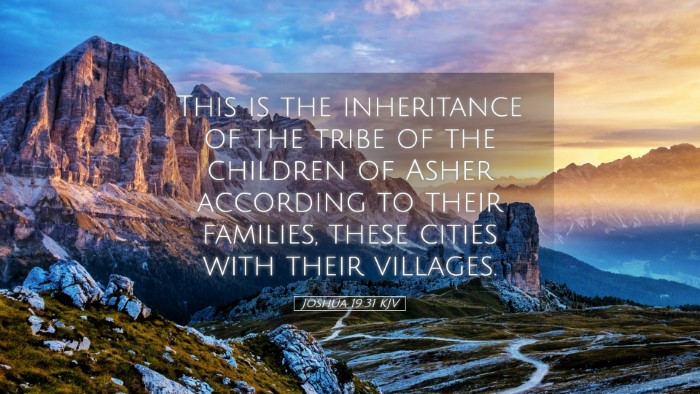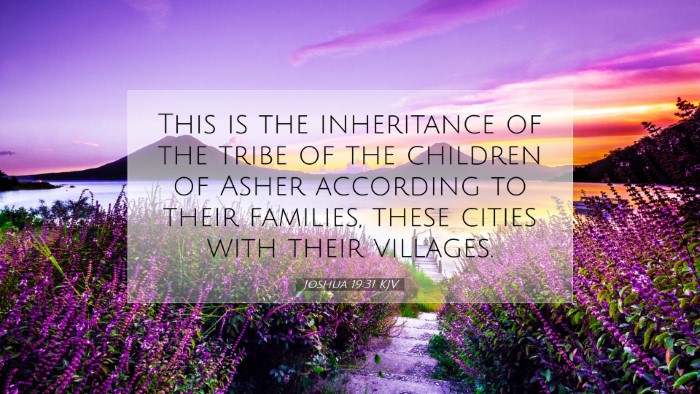Commentary on Joshua 19:31
Verse: "This is the inheritance of the tribe of the children of Issachar according to their families, the cities and their villages.”
Introduction
This verse marks the concluding statement of the inheritance granted to the tribe of Issachar, positioning it within the larger context of territorial allocations among the tribes of Israel. The significance of this passage lies not only in the geographical boundaries but also in its theological implications regarding God’s promises and the covenantal inheritance of His people.
Background Context
The division of the land among the tribes of Israel, as recorded in the book of Joshua, reflects God's fulfillment of His promises made to the patriarchs. According to Matthew Henry, the allocation of Issachar's territory suggests both physical and spiritual inheritance, emphasizing the idea that the land serves as a covenant testament to the enduring faithfulness of God.
Historical Significance
Issachar, being one of the sons of Jacob (Israel), is positioned strategically within the Promised Land. The location of Issachar's inheritance is characterized by rich agricultural land, as noted by Albert Barnes, who highlights the tribe's pastoral nature and their inclination towards agriculture, which were vital for sustenance and prosperity.
Theological Insights
In analyzing Joshua 19:31, we observe several theological themes:
-
Divine Providence:
The partitioning of land among the tribes is a direct result of God’s sovereign will. Adam Clarke expresses that the careful delineation of territories serves as a testament to God’s providence, ensuring that each tribe received what was suitable for their needs and capabilities.
-
Unity and Diversity:
The gifting of territories underscores the unity of Israel as a collective entity while celebrating diversity among its tribes. Each tribe has a unique role to play in the corporate life of Israel, as highlighted in various commentaries.
-
The Fulfillment of Promise:
Henry reflects on the fulfillment aspect of God's promises, pointing out how the distribution of land among the tribes fulfills the divine covenant and serves as a reminder of God’s faithfulness across generations.
Practical Applications for Today
The implications of Joshua 19:31 extend beyond its historical context into practical applications for modern readers, particularly pastors, students, and scholars:
-
Understanding God's Faithfulness:
This passage serves as a reminder of God's unwavering commitment to His people. Believers today are encouraged to reflect on God’s past provisions and promises while anticipating His future faithfulness in their lives.
-
Embracing Diversity in the Body of Christ:
Just as the tribes had unique territories and roles, so too are the members of the Church today called to embrace their unique gifts and responsibilities within the body of Christ. This diversity should not lead to division but rather strengthen unity and effectiveness in ministry.
-
Covenantal Relationships:
The inheritance of the land serves as a metaphor for the spiritual inheritance believers have in Christ. This can be a focal point for teaching on covenantal theology, reminding the congregations of the new covenant established through Jesus, which grants all believers access to God’s promises.
Conclusion
Joshua 19:31 encapsulates a moment of divine fulfillment and communal identity for the Israelites through the inheritance of the tribe of Issachar. The insights gleaned from public domain commentaries enrich our understanding and application of this verse. As we contemplate the sacred text, may we recognize God's providential care, embrace the diversity within the Church, and evidence a steadfast hope in God's promises, assuring that they hold true for all generations.


